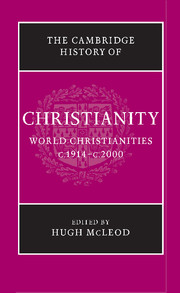Book contents
- Frontmatter
- 1 Introduction
- 2 Being a Christian in the early twentieth century
- PART I INSTITUTIONS AND MOVEMENTS
- PART II NARRATIVES OF CHANGE
- 8 The Great War
- 9 The Christian churches and politics in Europe, 1914–1939
- 10 Latin America, c.1914–c.1950
- 11 African Christianity: from the world wars to decolonisation
- 12 The African diaspora in the Caribbean and Europe from pre-emancipation to the present day
- 13 Christianity in the United States during the inter-war years
- 14 Christian churches in Australia, New Zealand and the Pacific, 1914–1970
- 15 Catholicism and Protestantism in the Second World War in Europe
- 16 The Cold War, the hegemony of the United States and the golden age of Christian democracy
- 17 The religious ferment of the sixties
- 18 The crisis of Christianity in the West: etering a post-Christian era?
- 19 The revolutions in eastern Europe and the beginnings of the post-communist era
- 20 The transformation of Latin American Christianity, c.1950–2000
- 21 Religion and racism: struggles around segregation, ‘Jim Crow’ and apartheid
- 22 Post-colonial Christianity in Africa
- 23 South Asia, 1911–2003
- 24 Christianity in South-East Asia, 1914–2000
- 25 East Asia
- PART III SOCIAL AND CULTURAL IMPACT
- Bibliography
- Index
- References
11 - African Christianity: from the world wars to decolonisation
from PART II - NARRATIVES OF CHANGE
Published online by Cambridge University Press: 28 March 2008
- Frontmatter
- 1 Introduction
- 2 Being a Christian in the early twentieth century
- PART I INSTITUTIONS AND MOVEMENTS
- PART II NARRATIVES OF CHANGE
- 8 The Great War
- 9 The Christian churches and politics in Europe, 1914–1939
- 10 Latin America, c.1914–c.1950
- 11 African Christianity: from the world wars to decolonisation
- 12 The African diaspora in the Caribbean and Europe from pre-emancipation to the present day
- 13 Christianity in the United States during the inter-war years
- 14 Christian churches in Australia, New Zealand and the Pacific, 1914–1970
- 15 Catholicism and Protestantism in the Second World War in Europe
- 16 The Cold War, the hegemony of the United States and the golden age of Christian democracy
- 17 The religious ferment of the sixties
- 18 The crisis of Christianity in the West: etering a post-Christian era?
- 19 The revolutions in eastern Europe and the beginnings of the post-communist era
- 20 The transformation of Latin American Christianity, c.1950–2000
- 21 Religion and racism: struggles around segregation, ‘Jim Crow’ and apartheid
- 22 Post-colonial Christianity in Africa
- 23 South Asia, 1911–2003
- 24 Christianity in South-East Asia, 1914–2000
- 25 East Asia
- PART III SOCIAL AND CULTURAL IMPACT
- Bibliography
- Index
- References
Summary
Introduction
An exciting event occurred in 1969 when the pope visited Uganda. He told his hosts that ‘you must have an African Christianity. Indeed, you possess human values and characteristic forms of culture which can rise up to be capable of a richness of expression of its own, and genuinely African.’ The audience was stunned, as if he were reversing the story of centuries of European relationship with Africa; as if he were proclaiming release from a relationship that suffocated in favour of one that recognised the pluralistic context of mission. It was as if Europeans finally acknowledged that after many years of missionary presence, an African expression of Christianity had emerged. That speech turned attention from patterns of insertion to modes of appropriation and their consequences, especially as the numbers of Christians in Africa had grown enormously. Perhaps being a musical people, African responses to the pope’s declaration could be traced in various liturgical initiatives and musical symbols. It meant that the story of African encounter with the gospel should privilege African initiatives and yet be told in an ecumenical and irenic manner.
- Type
- Chapter
- Information
- The Cambridge History of Christianity , pp. 197 - 218Publisher: Cambridge University PressPrint publication year: 2006



